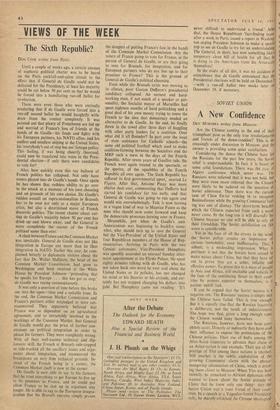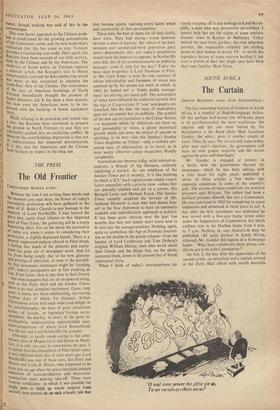SOVIET UNION
A New Confidence
DEV MURARKA writes from Moscow: Are the Chinese coming to the end of their triumphant pose as the only true revolutionaries and friends of the down-trodden? This is ill' creasingly under discussion in Moscow, and the answer is providing some quiet satisfaction. Considering the dance the Chinese have leJ the Russians for the past few years, the So% let relief is understandable. In fact, it is based on some solid foundations. There was the' case 01 Algiers conference which, never was. 1he Russians were relieved that it was not held, but they were even more relieved that the Chinese were likely to be isolated on the question Of Soviet admission. Then there was the curious case of Chou En-lai rushing in to recognise Boumedienrie while the growing Communist feel- ing was one of dismay. The short-term beneliti which the Chinese expected from such a Move never came. In the long run it will discredit the Chinese because no one will be able to rely on their friendship. The Soviet satisfaction on this score is considerable.
Yet in the face of all the straws in the wind, the Soviet policy creates an impression 01 curious immobility, even ineffectuality. This, I submit, is a misleading impression. What is pertinent is not that the Soviets have ceased It) make noises about China, but that they have set out to prove they are a sober, reliable anti effective power. To prove this to a mass of people in Asia and Africa, still excitable and volatile irl the face of the continuing threat to their coun- tries by powers superior to themselves, is :1 patient uphill task.
It can be argued that the Soviet success is 3 negative one. The Russians' success. is simply th31 the Chinese have failed. This is true enough, But it is equally true that the Russian inactivitY is deliberate, not the result of indecisiveness. The,hope was that, given a long enough rope, the Chinese would hang themselves.
The Russians, however, have not been com- pletely quiet. Directly or indirectly they have used their influence to expose the pretensions of the Chinese policies. Their use of India among the Afro-Asian countries to advance their claim as an Asian nation is one example. Their use of the prestige of Tito among these nations is another. Still another is the subtle exploitation of the grOwing Communist alarm with the phrase mongering adventurism of China, which is draw- ing them closer to Moscow. When Tito was here recently, he remarked to African diplomats who wanted to know about the Soviet attitude tit China. that he knew only one thing: that the Soviet Union was' a truet friend of their coun- tries. In"a ,speech at a Yugoslav-Soviet friendshiP rally, he sharply criticised the Chinese ideological stance, though nothing was said of this in the communiqud. This new Soviet approach to the Chinese prob- lem is conditioned by the growing polycentrism of the Communist camp, and the new leadership's realisation that this has come to stay. Vietnam provides. a fascinating case-study. Here again, the Russians have been accused of too little activity, both by the Chinese and by the Americans. The evolution of Soviet policy on Vietnam requires a separate article, but Kosygin's visit to Hanoi conspicuously reversed the Khrushchev line which was more or less reconciled to abandon the South-East Asia to the Chinese. The coincidence °f the start of American bombings of North Vietnam immediately brought the promise of Soviet defensive aid. It has been a slow process, but now even the Americans seem to be im-
Pressed with the build-up of Soviet equipment there.
While refusing to be provoked and rushed into
war. the Russians have continued to prepare mc ground in North Vietnam in case they are reluctantly pushed into an escalating conflict. In Moscow the overwhelming impression is thus not of indecisiveness but tempered determination. Lt is this that the Americans and the Chinese have to learn to respect in the long run.

















 Previous page
Previous page